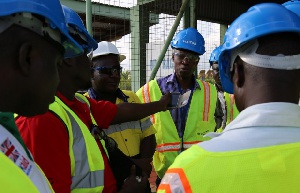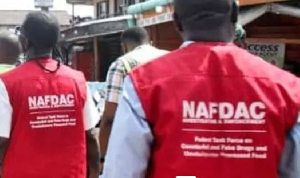Mining the world over, with Ghana inclusive, has often been associated with negativity in spite of its huge contributions to the socio-economic development of countries and their citizens.
This is due to the dire consequences of the activities and operations of some of the mining companies on people and the communities in which they operate, including the destruction of agrarian lands and poisoning through the use of chemicals like cyanide and mercury.
The Ahafo Mine of Newmont Ghana is one such company which has had its own share of criticisms and vilification over some of these acts including the controversial issue of cyanide spillage.
There were times the operations of the company nearly grounded to a halt due to intermittent standoffs with the chiefs and people in its area of operation.
With time, however, Newmont Ghana especially its Ahafo mine has managed to wean itself from this tag as a company whose activities and operations are impacting negatively on the community in which it operates.
Projects
Apart from pursuing a ‘culture of zero harm’ to ensure the safety of its several workers and its 10 host communities including Kenyasi No.1, Kenyasi No.2, Ntotroso, Wamahinso, Gyedu (in the Asutifi North District), Afrisipakrom, Adrobaa, Terchire, Susuanso and Yamfo (in the Tano North District) in the Brong Ahafo Region, the company has invested in infrastructural and human resource development.
For the past seven years, it has managed to win the confidence of the chiefs and people of these areas by undertaking various developmental projects by way of corporate responsibility through what has come to be known and accepted as the Newmont Ahafo Development Foundation (NADeF).
Established in May 2008 through a partnership between Newmont Ghana Gold Limited (NGGL) and the Ahafo Social Responsibility Forum to support community development programmes near Newmont’s Ahafo mine in Ghana, the Foundation has been able to complete not less than 78 infrastructural projects including a community health nurses’ training school, libraries, classroom blocks, health centres, nurses’ and teachers’ quarters, electricity extension, water facilities and ICT centres.
These projects are funded by Newmont Ghana through a commitment made in 2006 to set aside $1 of every ounce of gold sold and 1% of the Ahafo Mine’s annual net profit to help develop its host communities as part of its corporate social responsibility.
Commitment
Communications Manager at the Ahafo mine, Agbeko Azumah, says “…NADeF accumulated US$23 million as at June 2015 for sustainable development projects in the 10 communities.”
“US$12 million has been invested in community development and US$3.5 million into an endowment fund set aside for development programmes in the communities when mining comes to an end,” he told the paper during a recent visit to the mine by a team of journalists.
In that regard, he said Newmont Ghana in discussions with the Ahafo Social Responsibility Forum agreed to allocate the accumulated funds as follows: infrastructure 23%, human resource 24%, sports 4%, cultural heritage 12%, natural resources 4%, economic empowerment 17% and 16% to social amenities.
Supervision
To ensure the judicious use of funds, the Foundation is governed by a seven-member Board of Trustees comprising five community representatives and two Newmont Ghana representatives.
Newmont Ghana appoints the Chairman of the Board in consultation with the Ahafo Social Responsibility Forum, and discussions are ongoing to increase the community representation on the Board.
The Board has Project and Finance and Administrative Sub-Committees and a Secretariat which oversees the day-to-day administration of the foundation whiles each of the 10 communities has a seven-member Sustainable Development Committee that determines, in consultation with the community members and District Assembly, which projects to execute.
New Light
But one project that has caught the attention of many is the decision of the chiefs and people of Ntotroso to use their part of proceeds from the fund to establish a nursing training college to feed the country’s numerous health facilities which are struggling to make up the nurse-patient ratio.
The establishing of such a College of Nursing at Ntotroso to produce professional nurses in that part of the country is what has earned the chief and people widespread commendation.
The school, which is affiliated to the Kwame Nkrumah University of Science and Technology (KNUST) and offers General Nursing, is a three-year diploma awarding institution that started last year with an initial intake of 250 students.
This year the college, which has been duly accredited by the National Accreditation Board, enrolled 300 fresh students; thus bringing the current student population to 550.
It has a staff strength of 37, out of which 15 are teaching staff and the rest are non-teaching and administrative staff.
Facilities
The initial infrastructure for the school—an assembly hall complex, administration complex, hostel facility, classroom block and the principal’s bungalow—was provided by NADeF, with a three-storey lecture hall complex currently under construction. It has facilities such as ICT laboratory, library, six 90-seater classrooms, and offices for tutors, all funded by the Foundation.
In addition, it has also provided a Pick-up vehicle for the school, with the government assisting them with a mini bus whiles the Ntotroso Traditional Council has also made available its mini bus to help address the transportation needs of the school.
Management of the nursing training college has, as its short term goal (2014-2019), the acquisition of the status of a full-blown tertiary institution by running courses in Midwifery and General Anaesthesia.
Commendation
It is these and other social responsibility projects that have earned NADef commendation for the best practices in the mining industry by reputable local, national and international organisations. It has equally earned plaudit for its contribution to human resource development, having awarded 6,177 scholarships to tertiary and senior high school students in the area as well as apprenticeship training in areas such as tailoring and dressmaking, hairdressing, truck driving, electrical and mechanical skills.
It has also been credited with improving the academic performance of basic level students and organising mock examinations for Basic Education Certificate Examination (BECE) candidates in communities in the Ahafo North District as well as empowering locals economically with micro-credit and business start-up projects for 857 clients.
But the Communications Manager of the Ahafo mine, Agbeko Azumah, insists that “sustainability is a core value of Newmont.”
To that end, he said “we serve as a catalyst for local economic development through transparent and respectful stakeholder engagement and as responsible stewards of the environment.”
Regional News of Tuesday, 27 October 2015
Source: Charles Takyi-Boadu













